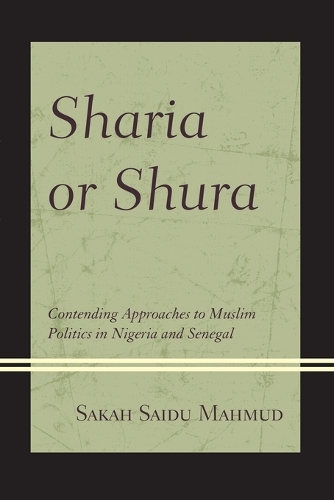
Sharia or Shura: Contending Approaches to Muslim Politics in Nigeria and Senegal
(Paperback)
Publishing Details
Sharia or Shura: Contending Approaches to Muslim Politics in Nigeria and Senegal
By (Author) Sakah Saidu Mahmud
Bloomsbury Publishing PLC
Lexington Books
27th March 2017
United States
Classifications
Professional and Scholarly
Non Fiction
Comparative politics
Islam
320.22709663
Physical Properties
Paperback
196
Width 149mm, Height 231mm, Spine 14mm
286g
Description
This book explores the differences in Muslim attitudes and approaches to the public square in sub-Saharan Africa via a comparative-historical analysis of Muslim politics in Northern Nigeria and Senegal since independence in 1960. While Northern Nigeria has been mired in intermittent religious conflicts and violence, Senegal has maintained peaceful and tolerant relationships in inter-faith and public affairs. Yet, the two Muslim societies had similar Islamic backgrounds in Sufi orders Qadiriya and Tijaniya in Northern Nigeria; and Tijaniya, Muridiya, Qadiriya and Lahiniya in Senegal known for their peaceful approach to public affairs. Furthermore, the two Muslim societies belong to the black African Islamic cultural zone. These common traits would suggest similar approaches to public affairs, but this has not been the case. The salient factors which are analyzed in the book include the historical factors (the success or failure to establish an Islamic state and the impact of different colonial administrations and ideologies), the extent of homogeneity of the social structure in each country, and strength of the contemporary state in both countries. The combination of these factors illustrates the experiences of the Muslims which further determine their divergent approaches to the public square.
Reviews
This rare book exemplifies the best in comparative politico-religious analysesto capturedifferencesin violent and pacifist Muslim (Sufi) responses,astools tonegotiate space(s) and resourcesin Northern Nigeria and Senegal, respectively. Professor Mahmud ably traces these contrasting Muslimexperiencesto historical junctures colonial policiesand outcomes, leadership, organizational structures of Sufi Brotherhoods, as well asthe role of post-colonial states. It is acarefully researched and eloquently written book that reminds us of Islam's non-violent Jihadist tradition an aspect of Islam too often forgotten or ignoredin pursuit of the Global War on Terror. -- Abdoulaye Saine, Miami University
The author must be praised for producing the first comparative study of two important West African Muslim societies. -- Ousmane Kane, Harvard University
Author Bio
Sakah Saidu Mahmud is associate professor of Political Science and the Head of the Department of Social Sciences and Global Studies at Kwara State University, Malete, Ilorin, Nigeria. His writings on politics of religion (Islam) include contributions to the Choice award-winning, Democracy and Religion: Free Exercise and Diverse Vision, (2004), and The Borders of Islam: Exploring Samuel Huntingtons Faultlines, from Al-Andalus to the Virtual Ummah (2009).
